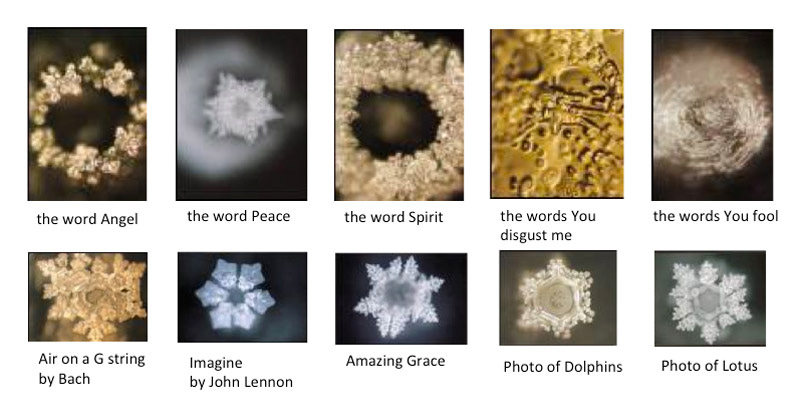The Ripple Effect: Dr. Emoto's Water Research and the Power of Self-Talk

In the realm of alternative science and consciousness studies, few figures are as compelling and controversial as Dr. Masaru Emoto. His research on the impact of words, thoughts, and feelings on the molecular structure of water has sparked worldwide intrigue and debate. While many in the scientific community have criticized his methodologies, his work has inspired a broader conversation about the implications of our intentions and self-talk on our well-being and the world around us (and within us).
Dr. Emoto's Water Experiments
Dr. Masaru Emoto, a Japanese researcher and author, became famous for his claim that human consciousness has an effect on the molecular structure of water. According to Emoto, positive expressions and emotions would lead to aesthetically pleasing water crystal formations when frozen, while negative intentions would result in disjointed and unattractive frozen structures.
The Experiment Process
Emoto's experiments involved exposing water to different words, pictures, or music, then freezing it and examining the aesthetic properties of the resulting crystals with microscopic photography. His book "The Hidden Messages in Water" published in 2004, includes a variety of photographs showing water crystals after being exposed to positive stimuli (like words such as "love" and "thank you") and negative stimuli (such as "hate" or heavy metal music).
Criticism and Controversy
It's important to note that Emoto's experiments have been criticized for lacking rigorous scientific methodology. His work was not published in peer-reviewed scientific journals, and there were questions about the reproducibility and objectivity of his results. Critics argue that the formation of water crystals is highly susceptible to changes in temperature and environmental conditions, and the process of selecting 'beautiful' crystals could be highly subjective.
Implications for Self-Talk and Mind Habits
Despite the controversy surrounding Emoto's research, the idea that our intentions and thoughts can affect our environment resonates with many. The human body is 45-75% water. We can influence the water in our bodies based on the content of our thinking—positive or negative. The notion is similar to the placebo effect, known in medicine, where patient's beliefs can lead to real changes in health. This parallel has encouraged some people to draw connections between Emoto's findings and the power of self-talk and habits of mind.
The Power of Positive Self-Talk
Positive self-talk has been shown to have numerous psychological benefits. Psychologists and counselors often encourage individuals to engage in positive self-affirmations to combat negative thought patterns. The theory is that by affirming positive beliefs about oneself, an individual can foster a more optimistic outlook and resilience against stress.
Habits of Mind
Similarly, the concept of "habits of mind" refers to the attitudes and behaviors that we routinely use to confront challenges. Developing constructive habits of mind, such as persisting, managing impulsivity, and striving for accuracy, can influence our daily experiences and long-term success.
The Water Analogy
Emoto's research becomes a metaphor for how we might influence the 'inner environment' of our minds (and water) through habit and intention. If negative thoughts were to create 'dissonant' patterns in water, as Emoto suggests, it stands to reason that negative self-talk could disrupt our mental and emotional well-being. Conversely, cultivating positive thoughts and affirmations might be akin to creating harmonious and beautiful patterns within ourselves.
Building Better Self-Talk and Mind Habits
Regardless of the scientific standing of Emoto's work, the interest it has generated allows for a discussion on practical ways to improve self-talk and develop better habits of mind:
Awareness: Notice your self-talk and challenge negative narratives.
Affirmations: Use positive affirmations to reinforce self-esteem and confidence.
Gratitude: Regularly express gratitude, which can shift perspective to a more positive frame.
Mindfulness: Practice mindfulness to stay present and reduce negative rumination.
Journaling: Keep a journal to express emotions and reflect on thought patterns.
Cognitive Restructuring: Learn cognitive-behavioral techniques to reframe negative thoughts (e.g., cognitive distortions).
Community: Surround yourself with positive influences that reinforce uplifting self-talk.
While Dr. Emoto's water crystal research remains scientifically disputed, it has undeniably prompted a meaningful dialogue about the significance of our internal and external dialogues. The metaphor of water reacting to emotional stimuli invites us to consider how our own patterns of thought and speech may influence our lives. Whether or not water holds a secret message, the message to us is clear: the words we choose and the thoughts we nurture have the power to shape our reality (and inner world).



